07 Oct2020
By Jacqueline E. King, Ph.D.
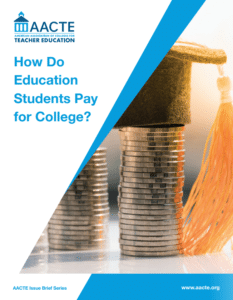 There is a growing body of research suggesting that concerns about compensation generally—and about being able to repay student loans in particular—are dissuading college students from choosing teaching as a career. These financial concerns have only been exacerbated by COVID-19 and its attendant financial crisis.
There is a growing body of research suggesting that concerns about compensation generally—and about being able to repay student loans in particular—are dissuading college students from choosing teaching as a career. These financial concerns have only been exacerbated by COVID-19 and its attendant financial crisis.
To help members better understand the financial pressures impacting education students, AACTE has released the new How Do Education Students Pay for College? issue brief that takes a detailed look at how students pursuing a bachelor’s degree in education pay for college, including the costs they face and the financial sources they tap to meet those expenses.
On Wednesday, October 21 from 3:00 – 4:00 p.m. ET, AACTE will host a webinar on this important topic. As the issue brief’s author, I will review the research findings, and I’ll be joined by AACTE consultant Jane West for a discussion of the implications of these findings for campus practice and federal policy. West will also share AACTE’s priorities for strengthening aid to future educators in federal appropriations bills as well as the reauthorization of the Higher Education Act.
The one-hour session will feature time for questions and discussion.
Register now.
05 Oct2020
By Jane E. West
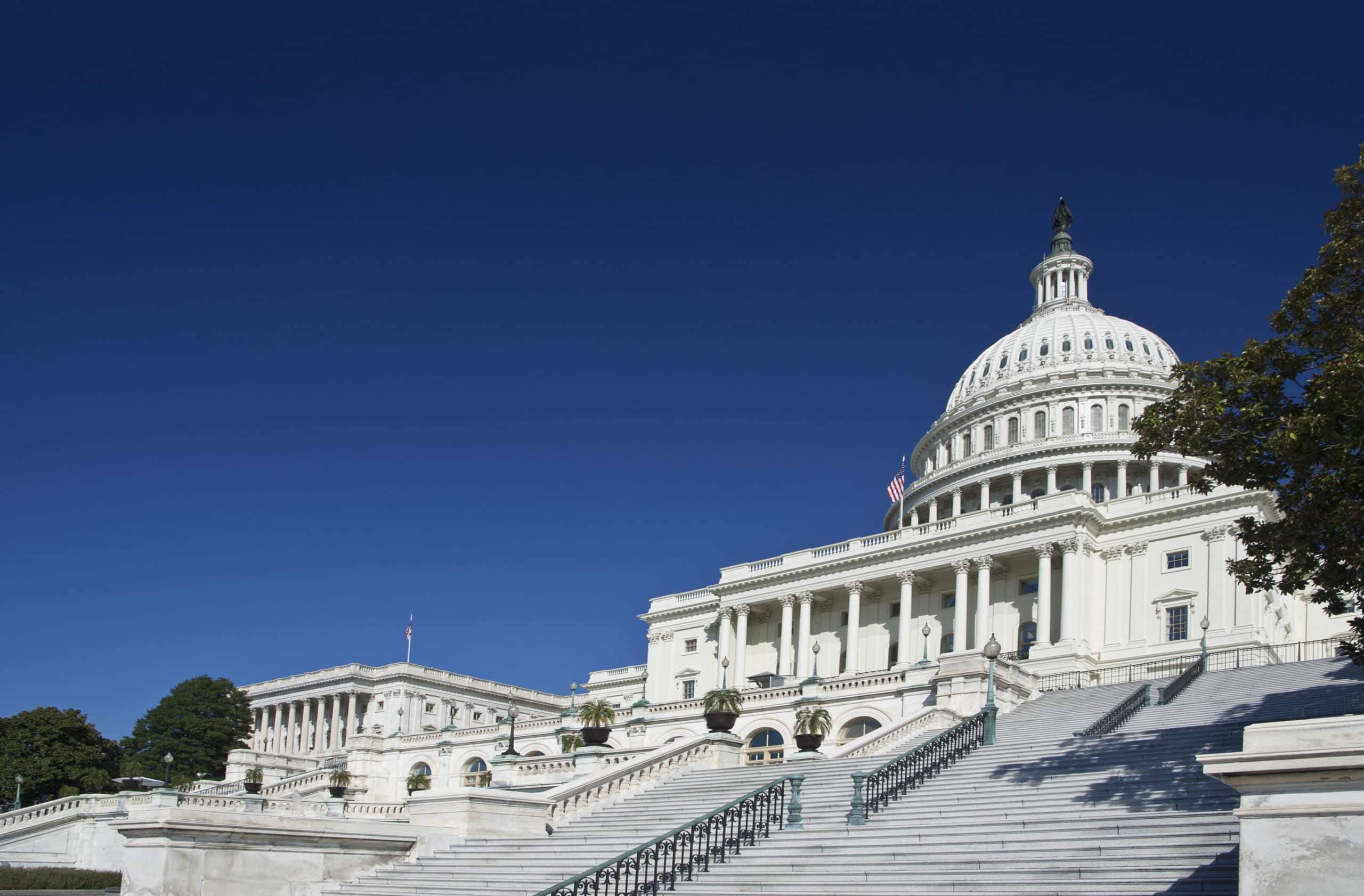 This blog post is written by AACTE consultant Jane West and is intended to provide updated information. The views expressed in this post do not necessarily reflect the views of AACTE.
This blog post is written by AACTE consultant Jane West and is intended to provide updated information. The views expressed in this post do not necessarily reflect the views of AACTE.
The Senate Passes Funding Bill to Avoid Government Shutdown/ COVID Funding Bill Remains Stalled
The federal fiscal year ended on Wednesday, September 30 at midnight. That day, the Senate passed a bill (with a 84-10 bipartisan vote) to keep the government funded at last year’s level temporarily—a stopgap measure called a Continuing Resolution. The House passed the same bill last week with a bipartisan vote. The President signed the bill a few hours after the deadline—early Thursday morning—so that functioning and funding of the federal government continues uninterrupted. The bill expires December 11, after the election, leaving a lame duck session of Congress to deal with it.
In the House, Speaker Pelosi (D-CA) was absorbed in trying to come up with a last-minute deal with the White House to secure a long-awaited next COVID relief package. She met repeatedly with Treasury Secretary Steve Mnuchin, who appears to be the White House’s lead on this, but did not achieve a final deal. So, she turned to her Democratic colleagues in the House and passed a trimmed-down version of the HEROES Act—their COVID relief bill that passed several months ago, but made no headway in the Senate.
29 Sep2020
By Jane E. West

This blog post is written by AACTE consultant Jane West and is intended to provide updated information. The views expressed in this post do not necessarily reflect the views of AACTE.
Passing of RBG Alters Landscape Moving Forward in Congress
The sudden passing of Supreme Court Justice Ruth Bader Ginsberg a week ago—and the subsequent immediate determination by President Trump that he would move a nominee to fill the vacancy quickly—have altered the DC landscape dramatically. Senate Majority Leader Mitch McConnell (R-KY) quickly assembled the 51 votes he needs for confirmation of her replacement. Chair of the Senate Judiciary Committee, Lindsay Graham (R-SC), has indicated that confirmation hearings for the new nominee may take place the week of October 12. All roads lead to a final floor vote in the Senate before the November 3 election, possibly on Halloween. The Democrats will be unable to block this vote. The only way it could fail is if three Republican Senators oppose the nominee. Two have indicated that they are opposed to this vote prior to the election (Sen. Collins of Maine and Sen. Murkowski of Alaska), but the elusive third appears out of reach.
25 Sep2020
By Anne Tapp Jaksa and Beth Kubitskey
As first and third time AACTE Day on the Hill participants, we eagerly participated in this inaugural virtual event to prepare for congressional visits. Although we were not physically together, Lynn M. Gangone, president and CEO, made us feel welcomed and valued members of AACTE during her opening greeting to attendees.
Why Day on the Hill?
Beth: As a newbie, I wondered about the lay of the land. Then Jane West, AACTE government relations consultant, shared, “The Big Picture: Current Policy & Political Landscape,” providing a framework for what we need to do and why.
Anne: After three years of attending the event, I was inspired by Jane West’s quote: “If your voice isn’t heard, someone else’s is,” which provided us meaning.
What and how?
AACTE’s legislative priorities provided the framework. Having the specific agenda items gave us the focus we needed.
Jacqueline Rodriguez, AACTE vice president of research, policy and advocacy, joined West in stressing the importance of building a rapport. Rodriguez supported planning with spreadsheets and materials. AACTE gave the legislative framework and a foundation. We’re ready to work!
State and regional colleagues collaborated to plan for advocacy. Presenters joined the meetings, to support the planning process. The virtual format allowed people to “travel” amongst groups. We’re ready to plan!
21 Sep2020
By Jane E. West
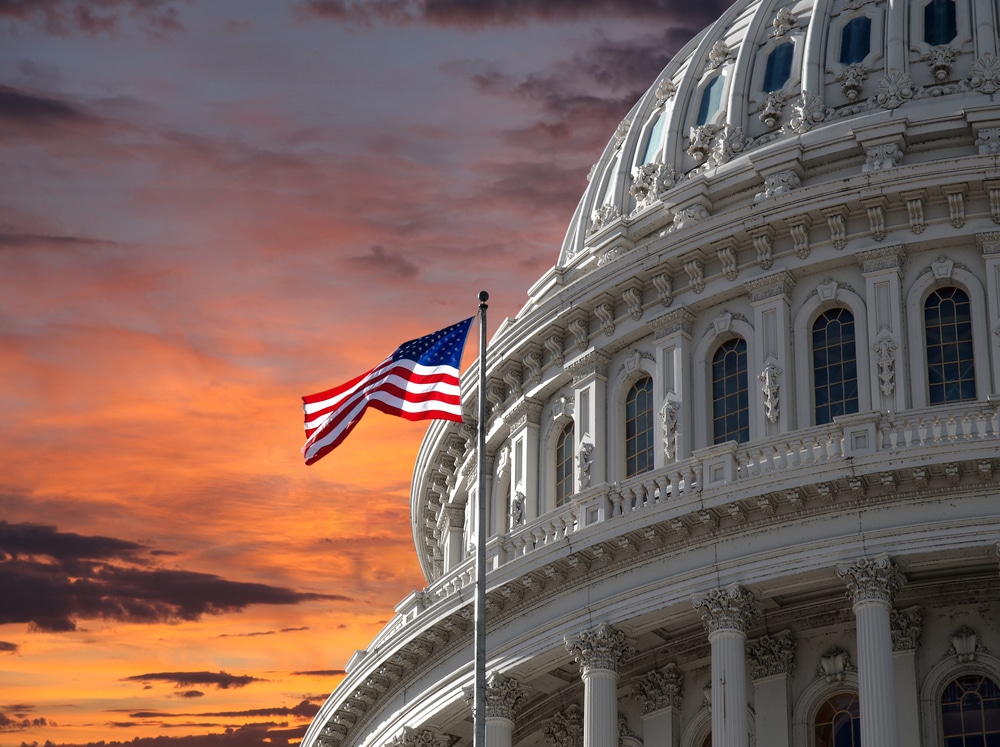
This blog post is written by AACTE consultant Jane West and is intended to provide updated information. The views expressed in this post do not necessarily reflect the views of AACTE.
Congress Looks to Avoid Government Shutdown after Failing to Move COVID Relief Bill
Remember your students who waited until the last minute to turn in their assignments? Well, they are all Members of Congress now! Congress will walk right up to the September 30 deadline before passing a short-term measure that will avoid a government shutdown and keep federal funding flowing. Called a “Continuing Resolution”—or CR—the bill will be a “simple extension” to continue current levels of funding for the time being. The White House, Senate and House leadership agree that this must be passed by the deadline and a shutdown must be avoided.
Two outstanding questions remain. The first is: What will the expiration date be for the CR? The answer is anywhere between mid-December and March.
The second outstanding question is what will and will not be attached to the CR? While all parties are agreeing on a “clean” CR—meaning no “poison pill” amendments—there are always what are known in Washington-speak as “anomalies.” These are friendly changes to law, which are not supposed to be controversial. Of course, ensuring that all parties agree that something is not controversial can be a challenge. Given that passage of a COVID relief bill failed to make progress last week, there will be pressure to add COVID-related provisions to this bill. Most anticipate that there will be no further action on a COVID relief bill until after the election in November. Stay tuned for some action on the CR next week.
14 Sep2020
By Jacqueline Rodriguez
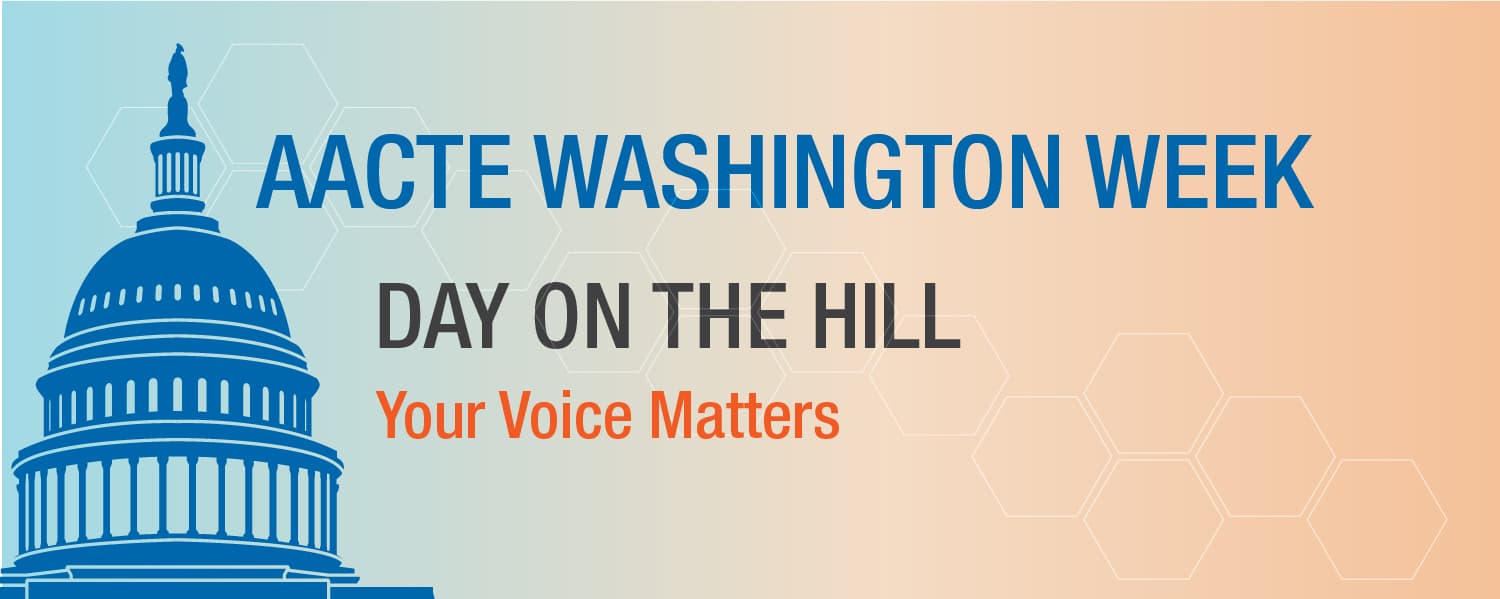 AACTE delivered its first virtual Day on the Hill advocacy event this past week. Over two days, attendees met with Congressional staff, AACTE Committee on Government Relations members, and panelists to develop their advocacy toolkit. This week, the attendees will host two days of Congressional visits with the senators and representatives from their states. AACTE state teams will be advocating for the AACTE 2020 Legislative Priorities, which describe the needs of educator preparation as we address twin pandemics: COVID-19 and racial injustice.
AACTE delivered its first virtual Day on the Hill advocacy event this past week. Over two days, attendees met with Congressional staff, AACTE Committee on Government Relations members, and panelists to develop their advocacy toolkit. This week, the attendees will host two days of Congressional visits with the senators and representatives from their states. AACTE state teams will be advocating for the AACTE 2020 Legislative Priorities, which describe the needs of educator preparation as we address twin pandemics: COVID-19 and racial injustice.
In preparation for their virtual Congressional Visits, attendees practiced how to communicate the priorities to legislative leaders, were briefed on current data related to educator shortages, the important to increase funding toward TEACH grants and Teacher Quality Partnership Grants within educator preparation programs, and the value of funding the Institute for Education Sciences, which is the principal research agency for education in the United States.
In addition, attendees received resources to support their learning. Each of these resources is available to all AACTE members!
11 Sep2020
By Ji Soo Song
 The undersigned members of the COVID-19 Education Coalition offer the following statement on the Delivering Immediate Relief to America’s Families, Schools and Small Businesses Act:
The undersigned members of the COVID-19 Education Coalition offer the following statement on the Delivering Immediate Relief to America’s Families, Schools and Small Businesses Act:
Our coalition is deeply concerned with the Delivering Immediate Relief to America’s Families, Schools and Small Businesses Act because of its low education funding levels, its fixation on physical reopenings of school buildings, and its failure to provide direct support for professional development in online learning. The bill would provide just $70 billion in additional K-12 education stabilization funds, a figure that is far short of the $200 billion that many educational groups feel is required to meet their needs. Additionally, we are concerned that the bill would condition receipt of two-thirds of this funding to the physical reopening of school buildings. This requirement ignores recent reports showing that 95% of districts plan to offer remote instruction to some degree, with about a third planning on remote instruction exclusively. This restriction makes no sense and will only adversely impact marginalized communities, including students of color, homeless students, students in foster care, and students with disabilities.
We also must note that this bill fails to provide separate funding for a key priority: professional development for online learning. Recently released studies point to the urgent need to support educators to deliver effective and equitable learning experiences. For example, more than one-fifth of educators have not received any training as it relates to technology-based remote instruction. A separate survey shows that a majority of novice educators do not feel well-prepared to provide online learning experiences for their students, as their preparation programs had not trained them on research-based technology integration frameworks.
03 Aug2020
By AACTE

On behalf of the Board of Directors of the American Association of Colleges for Teacher Education (AACTE), President and CEO Lynn M. Gangone issued the following statement today regarding the Immigration and Customs Enforcement agency’s guidance that forces colleges and universities to reopen with in-person classes:
“AACTE is appalled by efforts to deny international students from attending U.S. colleges and universities on the basis of enrollment in online versus in-person classes. The U.S. Immigration and Customs Enforcement agency’s position prohibits new or initial students on foreign visas after March 9 from entering the country and enrolling in fully online courses, thus forcing them to take other measures, such as transferring to a school with in-person instruction this fall. This policy is both harmful to the health, safety, and overall well-being of the students and detrimental to their educational trajectories. Additionally, this action exacerbates the complex challenges institutions of higher education already face during this unprecedented time.
03 Aug2020
By Jane E. West
 Senate Republicans Reveal Proposal for Next COVID Relief Package—a Nonstarter for Democrats
Senate Republicans Reveal Proposal for Next COVID Relief Package—a Nonstarter for Democrats
We ended the week with the chasm between Democrats and Republicans looming as the clock ticks toward recess and campaigning, not to mention expiring unemployment benefits, expired eviction prohibitions and schools and higher education struggling with reopening plans. Leader McConnell revealed the HEALS Act—the Senate Republican response to the House Democratic HEROES Act—as the opener for negotiations on the next COVID relief package. A third proposal, CCERA, was put forward by Senate Democrats. A comparison of education spending in the three bills reveals the following:
03 Aug2020
By Lynn M. Gangone
 This moment in time is anything but typical. As the beginning of the school year nears and the pandemic surges, we are left wondering, what will our classrooms look like this fall? Preparing to return to school will look different for parents, students, and educators alike. And if the Trump administration has its way, all schools and universities will be forced to reopen with in-person education.
This moment in time is anything but typical. As the beginning of the school year nears and the pandemic surges, we are left wondering, what will our classrooms look like this fall? Preparing to return to school will look different for parents, students, and educators alike. And if the Trump administration has its way, all schools and universities will be forced to reopen with in-person education.
Determined to open schools despite the surge in COVID-19 cases, President Trump threatens to withhold federal funds as a means to force schools and universities into on campus, in-person education. His statement in early July was issued when the Centers for Disease Control and Prevention (CDC) had yet to release updated guidance on how to safely reopen schools. In fact, the revised guidelines weren’t released until July 23—leaving schools only weeks to prepare for what will undoubtably be a monumental challenge.
Federal funds must not be used as leverage to force schools and universities to provide in-person classes amidst the current surge of the coronavirus. Instead, federal funds should be allocated to aid colleges and universities in their recovery from the significant, financial challenges caused by the pandemic, to equip institutions with the proper tools to reduce the spread of coronavirus on their campuses, and to provide liability protection.
28 Jul2020
By Jane E. West
This blog post is written by AACTE consultant Jane West and is intended to provide updated information. The views expressed in this post do not necessarily reflect the views of AACTE.
COVID Relief Package Progress Stalled
The Congress is scheduled to go into recess in two weeks. The election is about 100 days away. The nation is in crisis. Yet this week brought us a back and forth between the White House and Senate Republican leadership that yielded leaks of morsels about a proposed COVID relief package followed by retractions, clarifications and proclamations by individual Republican Senators that they have not seen any proposals nor been able to weigh in. Democrats are growing antsy—with two proposals on the table—HEROES Act in the House and the Coronavirus Childcare and Education Relief Act in the Senate. they are ready to negotiate. But no one is at the table yet.
A Senate Republican leadership bill was promised this week. A sketch of a proposal was leaked with the caveat that nothing had been finalized or agreed to. With Monday and Tuesday focused on honoring Rep. John Lewis in the Capitol, the business week will be short. The promise of that August recess is looking dim. With the federal unemployment checks scheduled to end at the end of the month and 1 in 5 workers now collecting unemployment benefits, much is at stake. Educators in both higher education and K-12 are struggling to make decisions now about school openings with little clear guidance and no sure knowledge of when or if there will be additional federal support.
20 Jul2020
By Jane E. West

This blog post is written by AACTE consultant Jane West and is intended to provide updated information. The views expressed in this post do not necessarily reflect the views of AACTE.
Action Expected in July on Next COVID Relief Bill: Education in the Crosshairs
Beginning next week, we expect to see the Senate take up the next COVID relief bill. The House has passed their version of the bill and Senate Democrats have introduced their version of the bill, so the next move is up Senate Leader Mitch McConnell (R-KY). His bill may be unveiled next week.
Education has become a high profile and contentious matter for this bill, as the president has determined that the economy cannot move forward unless schools are fully open in person so that parents and college employees (and workers in related businesses) can return to work in person. Multiple agendas are woven through this debate, which will become even more prominent as decisions are made about whether to apply conditions to any further COVID relief funding for education.
16 Jul2020
By Ji Soo Song

The undersigned members of the COVID-19 Education Coalition offer the following statement on the Coronavirus Child Care and Education Relief Act (CCCERA) and FY21 federal education appropriations:
As states and districts continue preparing for the upcoming school year, national data reveal the critical need to support educators’ capacity to deliver effective and equitable online learning experiences. For example, a recent survey revealed discrepancies in the quality of instruction available to students from higher-income versus low-income families. Although the CARES Act provided some federal dollars to support educator professional development, experts agree that the current education stabilization funds are inadequate to fully support schools, students, educators, and families through the COVID-19 global pandemic.
15 Jul2020
By AACTE
On behalf of the Board of Directors of the American Association of Colleges for Teacher Education (AACTE), President and CEO Lynn M. Gangone issued the following statement today regarding the Trump administration’s intent to withhold federal funds to force schools and universities to reopen with in-person education this fall:
“AACTE strongly opposes President Trump and U.S. Secretary of Education Betsy DeVos’s efforts to force schools and universities to reopen prematurely. Preserving the health and safety of students and educators during COVID-19 is essential to effective teaching and learning. The Trump administration has directed state and local governments to bear the responsibility for developing and implementing policies and practices to protect their citizens during the pandemic. As such, institutions must be allowed to implement feasible and practical measures for reopening tailored to the needs of their local communities.
Federal funds should not be used as leverage to force schools and universities to provide in-person classes amidst the current surge of the coronavirus. Instead, federal funds must be allocated to aid colleges and universities in their recovery from the significant, financial challenges caused by the pandemic, to equip institutions with the proper tools to reduce the spread of coronavirus on their campuses, and to provide liability protection.
AACTE calls upon our nation to protect the health and well-being of those most vulnerable in our education communities and to implement bipartisan efforts that will strengthen school safety plans.”
13 Jul2020
By Katrina Norfleet
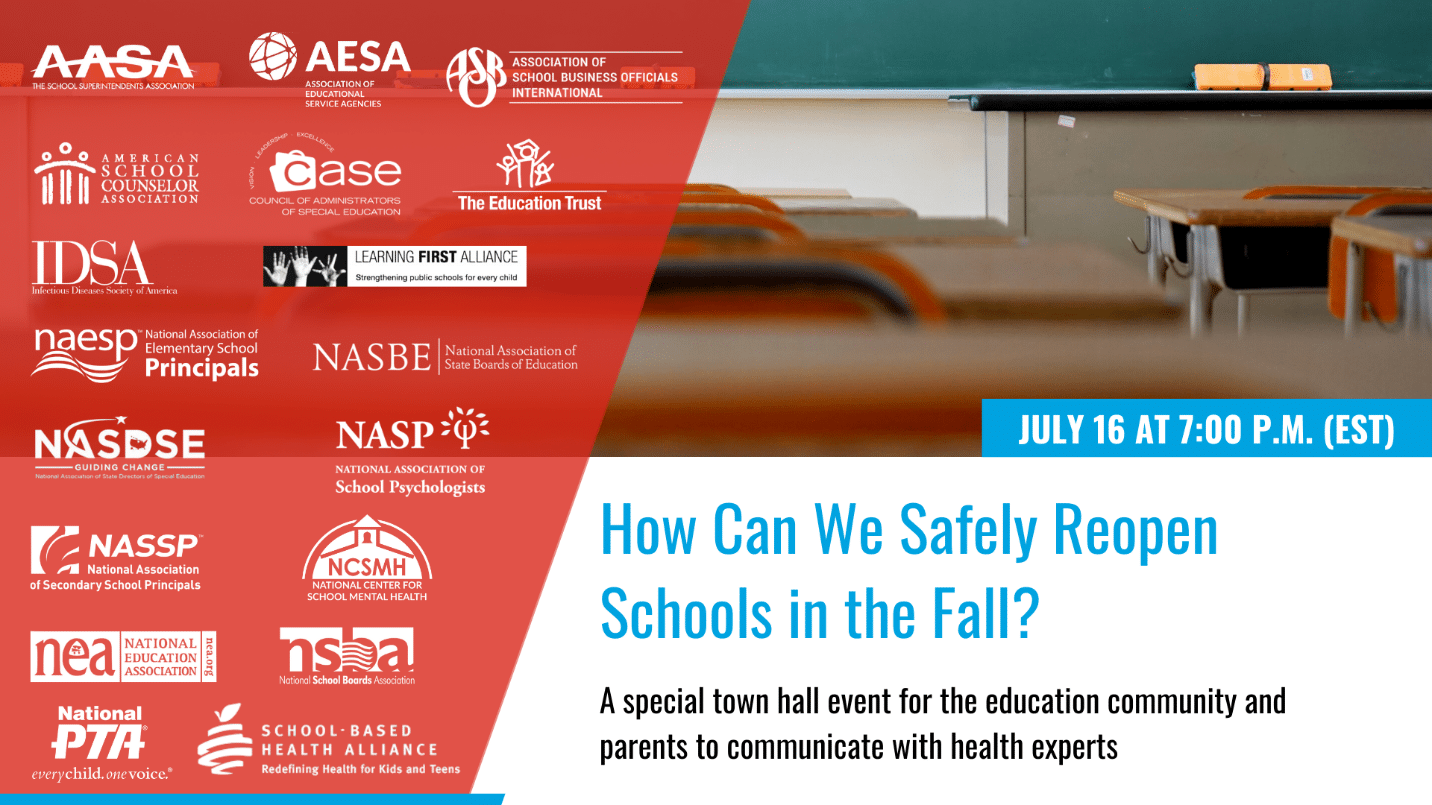
The education community and parents are invited to join a virtual town hall to talk with health experts about the re-opening of schools in the fall. The event, hosted by a group of national education organizations, will take place Thursday, July 16 from 7:00 – 8:15 p.m. ET.
When COVID-19 began its slow spread across the country, schools in every state shut their doors to help flatten the curve—and they stayed closed for in-person instruction through the rest of the 2019–20 school year. While businesses and other industries are beginning to reopen, it’s clear that the economy relies on our public education system for true recovery.
 There is a growing body of research suggesting that concerns about compensation generally—and about being able to repay student loans in particular—are dissuading college students from choosing teaching as a career. These financial concerns have only been exacerbated by COVID-19 and its attendant financial crisis.
There is a growing body of research suggesting that concerns about compensation generally—and about being able to repay student loans in particular—are dissuading college students from choosing teaching as a career. These financial concerns have only been exacerbated by COVID-19 and its attendant financial crisis.






 This blog post is written by AACTE consultant Jane West and is intended to provide updated information. The views expressed in this post do not necessarily reflect the views of AACTE.
This blog post is written by AACTE consultant Jane West and is intended to provide updated information. The views expressed in this post do not necessarily reflect the views of AACTE.

 AACTE delivered its first virtual Day on the Hill advocacy event this past week. Over two days, attendees met with Congressional staff, AACTE Committee on Government Relations members, and panelists to develop their advocacy toolkit. This week, the attendees will host two days of Congressional visits with the senators and representatives from their states. AACTE state teams will be advocating for the
AACTE delivered its first virtual Day on the Hill advocacy event this past week. Over two days, attendees met with Congressional staff, AACTE Committee on Government Relations members, and panelists to develop their advocacy toolkit. This week, the attendees will host two days of Congressional visits with the senators and representatives from their states. AACTE state teams will be advocating for the  The undersigned members of the COVID-19 Education Coalition offer the following statement on the Delivering Immediate Relief to America’s Families, Schools and Small Businesses Act:
The undersigned members of the COVID-19 Education Coalition offer the following statement on the Delivering Immediate Relief to America’s Families, Schools and Small Businesses Act:
 Senate Republicans Reveal Proposal for Next COVID Relief Package—a Nonstarter for Democrats
Senate Republicans Reveal Proposal for Next COVID Relief Package—a Nonstarter for Democrats This moment in time is anything but typical. As the beginning of the school year nears and the pandemic surges, we are left wondering, what will our classrooms look like this fall? Preparing to return to school will look different for parents, students, and educators alike. And if the Trump administration has its way, all schools and universities will be forced to reopen with in-person education.
This moment in time is anything but typical. As the beginning of the school year nears and the pandemic surges, we are left wondering, what will our classrooms look like this fall? Preparing to return to school will look different for parents, students, and educators alike. And if the Trump administration has its way, all schools and universities will be forced to reopen with in-person education.

